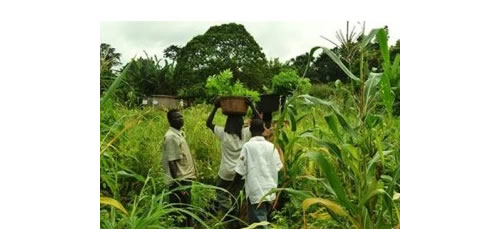African Youth Challenged To Be Proactive In Agri-Business

Kenneth Nana Amoateng, Chief Executive Officer, Abibiman Foundation has challenged African youth to be proactive and actively engage in a more profitable agricultural business activity to help change African the sector’s status quo and ensure food security.
“The youth must rise as agent of constructive change and development, when we actively involve the youth in the sectors such as agribusiness, that is when Africa stands the chance of eradicating youth unemployment,” he said.
Mr. Amoateng, speaking at the fifth anniversary of the African students and youth summit in Accra under the theme ‘climate change and implications for food security in Africa:’ he said: “in order to direct the dynamic energy of the youth, we must therefore, demonstrate and package agriculture as an innovative sector to explore, in order to make the argic business an attractive enclave easily accessible to the youth in Africa to become key contributors to the economy.”
He added that the youth must be helped with managers who will creatively, innovatively and actively fight food insecurity and create conditions, actions that are readily compatible in the African environment in order to naturalize the pervasive nature of climate change in Africa at large.
Mr. Amoateng indicated that, there is 60 percent global emission of carbon dioxide, and the youth must play a key role in this revolution to finding solutions to this predicament hovering around the continent.
Professor Etienne Ehile, Secretary General – Association of African Universities explained that agricultural production including food is projected to be severely compromised in African countries and that crop net revenue could fall by 90 percent by the year 2020; with small scale farmers being the most affected.
Prof. Ehile observed that African countries are vulnerable to climate change as too much dependent on rain fell agriculture, leads to high level of poverty, low level of human and physical capital, with poor infrastructural facilities.
“Drought and floods are a particular threat to food insecurity and could bring chronic diseases in the environment”.
“Preparing the youth to cope and sustainably address the challenges of climate change swallowing the continent is paramount to strengthening the capacities of youth to be more knowledgeable, vocal, active and effectively addr&ess climate change issues at the local and national levels,” he said.
He explained that the policy guidelines in the African Union’s agenda for 2063 which aims at the global sustainable development goals stipulates the plan of action for the people, for the planet, for prosperity, for peace and for partnerships to streamline the sustainable development goals which urges all to take urgent steps to combat climate change and its implications.
He noted that the Organization for African Development (OAD) flagship programme focuses on the provision of comprehensive input for the youth within Africa to be gainfully employed in the Agricultural value chain; for food growth is an innovative and attractive programme that needs to be given a particular attention to drive the agricultural value chain.
“Usually, both staple and cash crop agriculture most often rely on rain fed agriculture, rainfall vulnerability during the growing season leads to fluctuating food production from year to year; as a result, changes in rainfall leads to reduced harvest of staple food contributing to food insecurity around the continent”.
“It is also projected that, by 2020, there would be a substantially increased in the number of cities and human settlement adopting and implementing integrated policies and plans towards inclusion, resource efficiency, mitigation and adaptation to climate change as an expectation of reducing carbon food print and expediting the greening of Africa from all disciplines,” he remarked.





